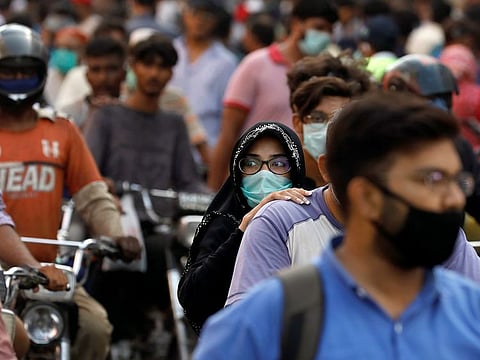WHO: COVID-19 spread through asymptomatic cases 'very rare'
Maria Van Kerkhove, WHO's technical lead on COVID-19, made the statement

Geneva: New coronavirus cases had their biggest daily increase ever as the pandemic worsens globally and has yet to peak in central America, the World Health Organization (WHO) said on Monday, urging countries to press on with efforts to contains the virus.
Maria Van Kerkhove, WHO's technical lead on COVID-19 said at the press briefing on Monday that many countries are reporting cases of spread from people who are asymptomatic, or those with no clinical symptoms. But when questioned in more detail about these cases, Van Kerkhove said many of them turn out to have mild disease, or unusual symptoms.
Although health officials in countries including Britain, the U.S. and elsewhere have warned that COVID-19 is spreading from people without symptoms, WHO has maintained that this type of spread is not a driver of the pandemic and is probably accounts for about 6% of spread, at most. Numerous studies have suggested that the virus is spreading from people without symptoms, but many of those are either anecdotal reports or based on modeling.
Van Kerkhove said that based on data from countries, when people with no symptoms of COVID-19 are tracked over a long period to see if they spread the disease, there are very few cases of spread.
"We are constantly looking at this data and we're trying to get more information from countries to truly answer this question,'' she said. "It still appears to be rare that asymptomatic individuals actually transmit onward.''
Not the time to stop taking precautions
"More than six months into the pandemic, this is not the time for any country to take its foot off the pedal," WHO Director General Tedros Adhanom Ghebreyesus told an online briefing.
More than 136,000 new cases were reported worldwide on Sunday, the most in a single day so far, he said. Nearly 75% of them were reported from 10 countries, mostly in the Americas and South Asia.
In response to a question on China, WHO's top emergencies expert, Dr. Mike Ryan, said retrospective studies of how the outbreak has been addressed could wait, adding: "We need to focus now on what we are doing today to prevent second peaks." Ryan also said infections in central American countries including Guatemala were still on the rise, and that they were "complex" epidemics.
"I think this is a time of great concern," he said, calling for strong government leadership and international support for the region.
Brazil
Brazil is now one of the hotspots of the pandemic, with the second highest number of confirmed cases, behind only the United States, and a death toll that last week surpassed Italy's.
After removing cumulative numbers for coronavirus deaths in Brazil from a national website, the Health Ministry sowed further confusion and controversy by releasing two contradictory sets of figures for the latest tally of infection cases and fatalities.
Ryan said Brazil's data had been "extremely detailed" so far but stressed it was important for Brazilians to understand where the virus is and how to manage risk, and that the WHO hoped communication would be "consistent and transparent".
Maria van Kerkhove said that a "comprehensive approach" was essential in South America.
More than 7 million people have been reported infected with the coronavirus globally and over 400,000 have died.
"This is far from over," van Kerkhove said.
Singapore
At least half of Singapore's newly discovered coronavirus cases show no symptoms, the co-head of the government's virus taskforce told Reuters on Monday, reinforcing the city-state's decision to ease lockdown restrictions very gradually.
Tiny Singapore has one of the highest infection tallies in Asia, with more than 38,000 cases, because of mass outbreaks in dormitories for its migrant workers. It reopened schools and some businesses last week after a near two-month lockdown.
"Based on our experience, for every symptomatic case you would have at least one asymptomatic case," said Lawrence Wong, adding that the discovery was made in recent weeks as Singapore ramped up testing.
Singapore has not previously disclosed how many asymptomatic cases it has recorded.
Ryan, asked about technical cooperation with the United States after President Donald Trump's announcement 10 days ago that it was terminating its relationship with the WHO, said the WHO relies heavily on experts from the U.S. Centers for Disease Control and Prevention and the National Institutes of Health.
"We will continue to do that until we are otherwise instructed or informed," he added.
- Inputs from AP, AFP, Reuters







